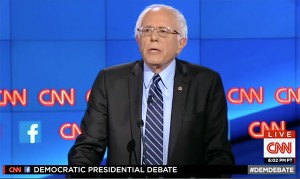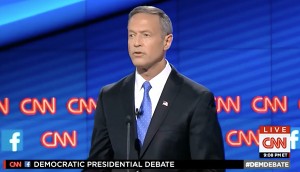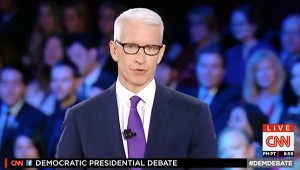Democratic debates: An exercise in showmanship
On the night of the Democratic debates, my uncle was probably playing Solitaire on his Kindle or watching a NOVA program via DVR. I was wishing I was able to watch a bunch of talking heads moderating a bunch of other heads, but was on the road. This begs the question: Why was my intelligent, civically-minded relative—who has the time and ability to watch political candidates debate issues of national concern — not tuning in? Well, he’s consciously decided to tune out.
When I asked him afterwards what he thought of the debates and he revealed that he “refused” to watch them, his reasoning surprised me.
“It’s just painful,” he said, “to watch a bunch of idiots who don’t know their history, don’t know up from down, talking over each other.” And he’s not making excuses. He’s got a degree in political science, and he’s well versed in both American and international events. Furthermore, I think he’s been disillusioned, and therefore disenchanted, by the whole process. As far as he’s concerned, it’s all an act.

The politicians line up and give their pre-rehearsed monologues, then hit all the right talking points in a battle of policy-centered adlibbing. It’s a PR battle, and they’re representing not the American public, nor the best interests of the average citizen, but of their own self-image and prowess.
I see that. While catching up on the whole spectacle, I not only watched it on YouTube but read the transcript from The New York Times.
- Note: I always read transcripts, because otherwise you might only “hear” what you “see.” In other words, you fall for the act while failing to stop and think, “What? They really said that?” Reading someone’s words makes you think about the words; Hearing someone’s voice makes you think about the person. At least that’s my theory.
- Anyways, I read the transcript and watched the video, and I was pleasantly surprised by not only the occasional soundness of mind represented therein, but the entertainment value (I expected the Republican debates to be interesting, but was anticipating somewhat of a snooze-fest for the Democrats). I did, however, see exactly what my uncle was talking about.
Most of the candidates got up there during their introduction and gave us a history lesson on … well, themselves … as a political brand. I don’t know about you, but I personally don’t care how many kids they have, and I can Google any one of them to find out what jobs they’ve held in the past or if their spouse makes a good pot roast. (Maybe not that second fact, but you get my drift.) In any case, they essentially went into a job qualification screening and treated the first thirty seconds like a first date.
Yes, I know, we emphasize likability, but when you only have a limited time, wouldn’t it be more efficient to simply jump right to the main point? Namely, could you just skip to a problems and solutions template? Save all the personal details for your campaign ads, because those are commercials for you — the person, the candidate, the legend in your own mind.
 The debates are a chance for you to impress us not with your own personal image, not with your personality, but with your ability to answer questions coherently and intelligently, think well under pressure, prove that you know the issues plaguing modern day America, and convince us that you’re the best person to handle those issues.
The debates are a chance for you to impress us not with your own personal image, not with your personality, but with your ability to answer questions coherently and intelligently, think well under pressure, prove that you know the issues plaguing modern day America, and convince us that you’re the best person to handle those issues.
That being said, I’ve made no secret of my little Clinton plug. Yes, I admit: I’m a woman who wants a woman as president. There, I said it. And that, as a motivating rationale for my civilian participation, is stupid. After all, if the woman applying for the job isn’t qualified, there’s no reason to hire her. But Clinton is technically extremely qualified; she knows the issues and has spent years establishing her views and interests. She just doesn’t come across as particularly trustworthy, and — quite frankly — she did worse than “mishandle” the email scandal. By acting like it was no big deal, she discredited herself a few solid points, as anyone with a brain and a computer knows how easy hacking truly is.
- I hate to be a trouble-maker who actually cares about the whole fiasco, but it seemed hypocritical for her to stand by her negative opinion of Snowden and then fail to see how her own actions contributed to a potential security threat.
This debate may have shown off her polished oratory skills, but the contrast between reading the transcript and watching “the show” illustrated an important point.
Watching Hillary Clinton, Jim Webb, Lincoln Chafee, Martin O’Malley and Bernie Sanders during the debate, it became evident that at the end of the day, it is still a show. From the impassioned gesturing to the circumnavigating responses to some tough questions, it is still a platform for people to get their name out there and try to gain just a slight edge over their opponents. Why else would Webb be so concerned about his speaking time? When he did speak, he mostly gave anecdotes. They weren’t poor, irrelevant examples, but they weren’t specific and they didn’t provide proper support for his speaking points.

One big thinking pattern that seemed to be a recurring error (from my perspective) was the tendency of all candidates to skim over the root cause of many systematic problems in this country and go straight to the symptoms. Maybe that’s why Sanders is gaining popularity.
He at least appears to understand that concept when it comes to a few big issues, such as gun violence. We have inadequate mental health care, and we have atrocious income inequality. These two detriments are huge reasons why mass shootings and violent crime remain a constant theme in our news reports. If it was as simple as registering or outlawing guns to keep them away from dangerous people, then most of the candidates there would be on the same page. But it’s not.
While he and O’Malley argued over how to respect cultural traditions without compromising on peaceful principles, the actual questions posed mostly targeted the question of whether or not it is even possible to control gun ownership without disrupting a system that has been in place for years, and without alienating entire regions of North America. Furthermore, examples of injustice following gun-related incidents don’t really address the reality of congressional legislating and its complexities, despite their relevance to the issue. Clinton’s staunch assertion that legislature regarding this issue isn’t as “complicated” as Sanders makes it out to be sounded hollow even to me. (I have a family of responsible gun-lovers, but I felt way too much of a rush shooting a gun to say I should ever comfortably own one.)
That’s just one example though, and while it’s great that I could see one politician with a “big picture” mindset (we have experts for all the specifics, folks), here’s my problem: Despite all the complaints the candidates list, many of which are indeed shared by the average citizen, the biggest threat to national security isn’t ISIS, and it isn’t climate change. It’s not the damn terrorists or cyber threats or global warming. It’s the lack of equal, accessible, and sufficient education about these things.

It’s the fact that we don’t think it’s important to sufficiently protect, support and fund the parents and teachers in this country on a federal level. They all hinted at this, and they all agree that we need extended leave for parents or better healthcare or some combination of the above. They all advocate for children. But none of the candidates seemed to view education as a fundamental issue in the same way that they viewed, say, protection of secure national data or green energy or foreign policy.
Now, education isn’t as simple as funding schools and students, just like economic wellbeing isn’t as simple as providing jobs. We need a cohesive system that looks at the elements by which we measure a nation’s security and welfare, and then we can begin building with the blocks that support such a state.
If we want the future to be not only worthwhile, but promising, we have to support children in tangible, intelligent, sustainable ways. Children who are subjected to subpar educations because they live in subpar districts are more likely to have teachers who parrot regional views on history, politics, science and yes, the beloved topic of climate change, rather than upgrading to the newest textbooks and quoting the latest scientific data. Children whose parents don’t have proper sick leave will be more likely to spend time with friends who may or may not have much in the way of role models and supervision themselves.
As an offshoot of that, our role models in politics are not doing their job. As it was pointed out during the debates, the polarization of American politics has become the new standard of interaction both amongst our leaders and the common folk, to the point where we are no having a civilized, thoughtful dialogue about matters that are significant. It was a little sickening hearing the Democrats congratulate and support one another, while leading members of both parties continually launch vague attacks and personally degrading statements about the opposition, rather than simply listing the views they disagreed with and why.
Watching both GOP and Democratic debates felt like watching one of those animated depictions of an autoimmunity disease. The American body is attacking itself from within, and all the while we’re trying to decide which radical new treatment to try.

Forget the treatment. Maybe Bernie Sanders is 100 percent right about one thing: We need a revolution. However, to do that, we need to work on finding the primary sources of our problems. What we are doing right now, in terms of policy, is treating our deepest wounds topically. We don’t address the problem with our budgeting process and the corruption within our corporate policies and lobbyist groups; we’re just concerned with where our money is going. (For an example of specific action here, look up the proposed Honest Initiative 122 in Seattle.)
Throwing money at education or laws at immigration reform is like giving thousands of money to PETA and The Human Society rather than foster care and hospitals. While that’s a great short-term solution, it doesn’t come close to obliterating the core obstruction to progress. If you really want to help animals, help the people who take care of them.
Damaged, mistreated people will probably be the ones damaging and mistreating animals. Likewise, creating more jobs with higher wages while not changing the financial infrastructure by creating laws to prevent large anonymous donations and keep politicians from lobbying immediately after leaving office is just asking for continued corruption in campaign financing.
Of course, everyone addressed the issues (some candidates more than others) in their own way, but the underlying cause — that is, the systematic indoctrination and continual dumbing down of the same people who might otherwise protest the economic strain placed upon them through restricted resources, unfair taxes, high interest rates, and therefore increased hardship in attaining and paying for a college education — is egregious.
Oh, and don’t get me started on how hard it is to get a good job even after you’ve gone to college. If you don’t have family members to help you out, you’re looking at years of unpaid internships and menial jobs to gain experience and pay the bills while you constantly send out applications and somehow find the time for job interviews for that entrance into a relevant, monetarily satisfying career. And the interest rates on student loans aren’t a mere “hindrance.”

If you look at the history of children in this country (helping hands in an agricultural society) and the history of poor people, immigrants and minorities (cogs in the industrial machine of quasi-capitalism), it looks like we are still the same kind of classist culture we might quickly admonish. If those in power are afraid to offer truly equal education and healthcare resources, they need to start reassessing their so-called solutions.
While I can’t say the debate gave me any kind of hope that this ugly undercoating will be scraped off and painted over any time soon, it at least hinted at a public awareness that people want more than buzz words. I even sensed a few moments of honesty here and there amidst all the (very) evident acting going on from a few politicians on stage.
Nevertheless, from my admittedly rather insignificant point of view, there is endless room for additional analysis and more direct proposals for solutions on a wider, more all-encompassing scale. The show must go on, and if they start improving the script … maybe more Americans will tune back in.
In the meantime, I predict that my uncle and many others will remain otherwise occupied.
(All photos via YouTube video)

Megan Wallin is a young writer with a background in the social sciences and an interest in seeking the extraordinary in the mundane. A Seattle native, she finds complaining about the constant drizzle and overabundance of Starbucks coffee therapeutic. With varied work experiences as a residential counselor, preprimary educator, musician, writing tutor and college newspaper reporter/editor, Megan is thrilled to offer a unique perspective through writing, research and open dialogue.
